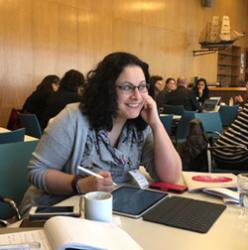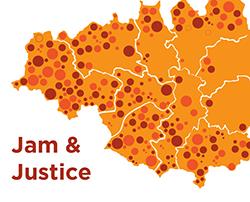Whilst a lot of attention has been paid to the Urban Sustainable Development Goal 11, with its focus on substantive issues such as transport, housing and the built environment, we mustn’t lose sight of the enabling conditions that will enable these targets to be met.
Delivering on the SDGs will require changes in urban governance and decision-making. Cities are complex, managed by multiple public and private organisations, operating across nested scales. Accepted wisdom focuses on developing appropriate partnerships to ensure that wicked, intractable problems can be addressed through collaboration.
Goal 16 of the SDGs brings these questions to the heart of the international agenda. A broad goal focussed on peaceful, just and inclusive societies, it seeks to address one criticism of the previous MDG agenda by centring questions of democracy, participation and empowerment.
Amongst its targets, Goal 16 aims to
- Develop effective, accountable and transparent institutions at all levels
- Ensure responsive, inclusive, participatory and representative decision-making at all levels
Some argue that goal 16 is really the most important transformative goal in delivering sustainable urban development in which traditional top-down elite forms of governance are abandoned, reimagined or revised.
Goal 16 is a clarion call to connect the ‘what’ to the ‘how’ of sustainable urban development. We need to draw on the rich vein of ideas and practices around participatory democracy to make Goal 16 a reality on the ground.
Several of the Mistra Urban Futures projects are seeking to do this. In Greater Manchester an Action Research Cooperative has been established to bring 18 academics, policy-makers, voluntary sector representatives, citizens and community organisers together to test and learn about citizen participation in urban governance. This is part of the Jam and Justice project, which Mistra Urban Futures co-funds with the ESRC.
The UK team is also looking at the role and value of citizen knowledges in sustainable urban development, via working with community groups to reveal contested narratives of place. This is also funded by the ESRC through the Open Research Area initiative.
In Sweden the Impact of Participation project, led by Stig Montin, Moa Tunström and Nazem Tahvilzadeh, seeks to map and evaluate participatory planning processes in Stockholm, Gothenburg and Malmo (along with other Swedish cities) since 2000 through coproduction with policy-makers and planners.
All projects were pump-primed by Mistra Urban Futures and secured national external funding from their respective national research agencies.
A recent conference in Leeds, Rethinking Global Urban Justice, provided an opportunity for dialogue between the UK and Swedish partners. The RC21 ‘Rethinking Global Urban Justice’ conference was held in Leeds from the 11th to the 13th September 2017. The event was organised by Research Committee 21 (RC21) on Sociology of Urban and Regional Development of the International Sociological Association.
The Sheffield Manchester platform initiated two presentation and debate sessions at RC21. The sessions asked: how does citizen participation challenge or reinforce power relations in urban governance? what might an urban politics look like which values dissent as well as consensus?
Bert Russell and Beth Perry ran a session entitled ‘From Participation to Power? Possibilities and Pitfalls in Co-Producing Urban Governance’. The session drew on the Jam and Justice project and brought together contributors from Sweden, India, Spain, UK, South Korea and Singapore to explore the limits and outcomes of participatory initiatives. Nazem Tahvilzadeh and Lisa Kings, from KTH Royal Institute of Technology, Stockholm, contributed to this session with an account of youth participation initiatives in Stockholm. Through a series of short provocations and discussions, the groups debated what ‘good enough’ participation might look like, the temporality of effect and multi-scale dynamics which shape degrees of urban autonomy.
These themes continued into a further session organised by Vicky Habermehl and Beth Perry entitled ‘Valuing Urban Dissensus’. Drawing on one of the UI’s Open Research Area projects, Whose Knowledge Matters, the sessions explored questions relating to the role and value of citizens’ knowledge in sustainable urban development projects. Magnus Johansson from Malmo University presented work on engagement initiatives in Sofielund. A plurality of cases had been selected to draw out themes around dissensus as community contestation, dissensus in everyday life and challenging business as usual. Urban case studies were presented from the UK, Spain, Israel, the Netherlands, Belgium, Sweden and India. A common theme was the need to avoid presenting over-simplistic binary cases of success or failure.
See also the Action Research Collective page
Photo by Alice Pasqual on Unsplash








